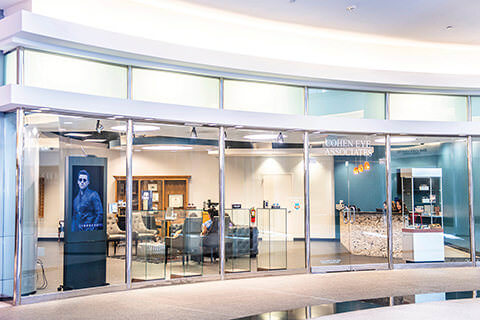
As the lead optometrist at Cohen Eye Associates, it is my job to educate patients about the importance of regular eye exams. There is a misconception that if you do not have eye or vision problems, you do not need to go to the eye doctor. This is a huge problem as eye diseases and vision loss develop gradually and can go unnoticed for years. As a wife and mother with a growing family, I want to help not only my individual patients but also their families to understand why eye health matters for each family member, no matter their age.
Children
Vision loss seems like it would be the first thing that anyone would notice going wrong; however, gradual vision loss can often go unnoticed, especially in young children who are unaware — oftentimes it can be a sign of a much larger problem. Children who experience vision loss think that’s the way the world is supposed to look, and they don’t inform their parents. Nearly 35 percent of preschoolers need vision correction, and the risk of nearsightedness and the advancement of nearsightedness continues through the school years.
 Concerning the health of the eyes, there are genetic eye diseases, childhood glaucoma, pediatric cataracts and developmental abnormalities which are all issues that include vision loss as a symptom. Any of the previously mentioned eye problems plus some less obvious vision problems can seriously affect the way a child learns. These issues can lead to struggling to focus on school work, poor hand-eye coordination, poor reading comprehension, lower efficiency and rapid fatigue due to eyestrain. In fact, undetected vision problems can display similar symptoms as Attention Deficit Hyperactivity Disorder (ADHD). Many children get misdiagnosed with ADHD when all they really needed was a pair of glasses.
Concerning the health of the eyes, there are genetic eye diseases, childhood glaucoma, pediatric cataracts and developmental abnormalities which are all issues that include vision loss as a symptom. Any of the previously mentioned eye problems plus some less obvious vision problems can seriously affect the way a child learns. These issues can lead to struggling to focus on school work, poor hand-eye coordination, poor reading comprehension, lower efficiency and rapid fatigue due to eyestrain. In fact, undetected vision problems can display similar symptoms as Attention Deficit Hyperactivity Disorder (ADHD). Many children get misdiagnosed with ADHD when all they really needed was a pair of glasses.
So, when should your child have eye exams? The American Optometric Association recommends children see an eye doctor at six to 12 months, at least once between 3 to 5 years old, right before they start first grade and annually after. Be sure to alert your eye doctor if your child has a history of prematurity, delayed development, poor eye tracking skills or if they frequently rub their eyes, blink excessively or are unable to maintain a fixated gaze on objects, or if your family has a history of eye issues and diseases as these are signs your child could be more at risk for eye issues and need to see an eye doctor more frequently.
Tweens and Teens
Tweens and teens should visit an eye doctor annually in order to learn how to better care for their eyes as there are several factors that put this age group at risk for eye infections or eye damage.
Attendance at school and participation in group activities increase the risk for problems such as conjunctivitis. Likewise, tweens and teens are staring at computer and tablet screens, which can lead to eye strain, blurry vision, trouble focusing at a distance, dry eyes and headaches. If patients know they will be staring at a screen for too long, they can discuss computer glasses or updating their prescription with their eye doctor. When doing an extended amount of near work, a good rule of thumb is to take time every 20 minutes to look at something at a distance of about 20 feet away. This helps to relax the eyes.
With this age comes major changes, which can impact confidence. As tweens and teens begin using makeup, they need to be aware of the risks and rules of eye makeup. For example, eye brushes should be cleaned at least twice a month. Using old makeup can increase the risk for serious eye infections, and eye makeup brushes should never be shared.
With all of the extreme changes going on in the lives of tweens and teens, the right pair of glasses can do wonders for their confidence. Not only will they be able to see properly by having the most updated prescription, but they can find frames that are the right color and shape to perfectly accentuate their best features. There’s no need to feel insecure when wearing glasses. One of my favorite parts of my job is helping my patients, one-on-one, find the perfect frame to fit their face and features.
Those that are at risk or those that wear contacts and glasses should see an eye doctor annually. Tweens and teens should be seeing the eye doctor at least once every two years if they show no signs of eye issues.
 Adults
Adults
Vision loss that adults typically blame on getting older can be signs of something much more serious. With the latest retinal imaging technology at our practice, Cohen Eye Associates, we are able to evaluate high-resolution images of the back of your eyes, which is critical in detecting early signs of serious issues such as retinal detachments, retinopathy and glaucoma. Detecting these issues early allows a doctor to treat it before it gets worse. Not only can this technology save you from major damage later on, but the eyes do not have to be dilated, which means you can avoid side effects, such as eye drops that sting, and conveniently go back to work after your exam.
Those that are at risk or need a prescription should see their eye doctor annually. It is especially important for adults 65 and older to visit their eye doctor at least once a year.
For more information, please visit www.cohen-eye.com or call 713-658-8301. Follow us on Instagram and Facebook.
Photos courtesy of PR Boutique














